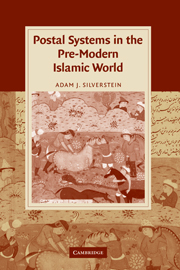Book contents
- Frontmatter
- Contents
- List of maps
- Acknowledgements
- List of abbreviations
- Introduction
- PART I THE PRE-ISLAMIC BACKGROUND
- 1 Pre-Islamic postal systems
- PART II CONQUEST AND CENTRALISATION – THE ARABS
- PART III CONQUEST AND CENTRALISATION – THE MONGOLS
- Conclusions
- Appendix: distances and speeds of the Barīd
- Bibliography
- Index
- Cambridge Studies in Islamic Civilization
1 - Pre-Islamic postal systems
Published online by Cambridge University Press: 18 July 2009
- Frontmatter
- Contents
- List of maps
- Acknowledgements
- List of abbreviations
- Introduction
- PART I THE PRE-ISLAMIC BACKGROUND
- 1 Pre-Islamic postal systems
- PART II CONQUEST AND CENTRALISATION – THE ARABS
- PART III CONQUEST AND CENTRALISATION – THE MONGOLS
- Conclusions
- Appendix: distances and speeds of the Barīd
- Bibliography
- Index
- Cambridge Studies in Islamic Civilization
Summary
In simple terms, the Barīd was a messenger service whose agents delivered messages between a caliph and his provinces. As a general rule, messages from the caliph contained official orders and decrees, while messages from the provinces would consist of reports on the local state of affairs. Thus, messages and messengers were central if not inherent to the functioning of the Barīd. Equally important is the fact that messages and messengers are central to Islamic discourse. The Arabic root r. s. l. (‘to send’) is the pivot around which Allāh's communication with man rotates. Scripture, in both its superseded and final forms, was invariably transmitted to humans through the medium of thousands of messengers (rusul, sing. rasūl) culminating in the mission (risāla) of Muḥammad, God's Messenger (rasūl allāh). It is therefore of considerable interest to this study that, in spite of the suitability of the Arabic root r.s.l., the name of the messenger system employed by the caliphs was coined from a non-Arab word and that most technical terms used in the Barīd were also of foreign origin.
Clearly, the Barīd was not a characteristically ‘Arabian’ institution. Whether the early caliphs incorporated pre-Umayyad Arabian methods of communication into their Barīd is debatable and will be examined later on. What is unquestionable is that early Muslims identified their messenger system with foreign, non-Arab cultures, a fact that is spelt out by their choice of such terms as fayj (‘courier’), furāniq (‘courier-guide’), askudār (‘portfolio’), kharīṭa (mail-bag), and even mīl (‘[Roman] mile’) and farsakh (‘parasang’) in the Barīd service.
- Type
- Chapter
- Information
- Postal Systems in the Pre-Modern Islamic World , pp. 7 - 52Publisher: Cambridge University PressPrint publication year: 2007

